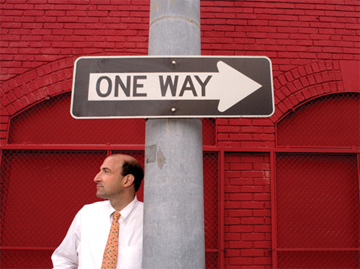






 |
||||
 |
 |
 |
 |
 |
 |
||||
|
J U N E 2 0 0 5 I S S U E The Big Question
|
|
| Peter Beilenson, MPH '90, has been Baltimore City's health commissioner for more than 12 years. |
 Q: If you could magically change one thing about Baltimore, what would it be? A: I'd create a job paying a living wage for everyone who desires it. "I think everyone in this country has the right to three things: a job paying a decent wage, decent housing, and affordable health care. Because a living wage is calculated based on what can be afforded in that community — including housing and health care — a livable wage job would give you all of those things. "But it also would address other issues the city faces. Hopefully, it would mean fewer people involved in the drug trade. A huge number of folks get involved from a very early age — 11, 12, 13 — in part to help support their families. They see the drug trade as a much more productive career path than finishing high school or getting a job because there just aren't decent jobs out there. And the drug trade is the overwhelming contributor to homicide, violent crime, and most property crime in most major urban areas. "Similarly, homelessness is mostly caused by a lack of affordable housing. Plus, many homeless people have substance-abuse, mental-health, and other issues that, with health insurance, they would be able to deal with. Because, remember, a living wage would provide health care benefits. And then there'd be tax-payer savings in terms of less tertiary care being needed to deal with strokes and heart disease because preventive care would be available. And more importantly, people would be living healthier lives because they have health insurance. "It serves everybody's purpose — not just from a philosophical point of view, but actually from a financial point of view — to bring everyone up to a certain economic footing. In our state, 84 percent of those who are uninsured are working poor themselves or a family headed by a worker. And the cost of their health care is born by taxpayers. The same with homeless services, welfare benefits, unemployment benefits, whatever. The costs of taking care of people who don't have livable wage jobs are immense." |
 |
|
 The Johns Hopkins Magazine |
901 S. Bond St. | Suite 540 |
Baltimore, MD 21231
The Johns Hopkins Magazine |
901 S. Bond St. | Suite 540 |
Baltimore, MD 21231Phone 443-287-9900 | Fax 443-287-9898 | E-mail jhmagazine@jhu.edu |
|